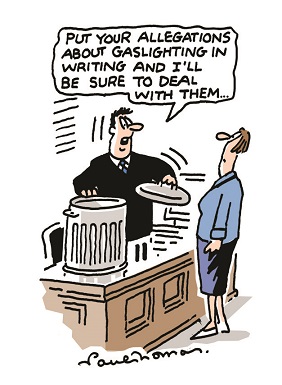
advice & support
Disciplinary and grievance
MiP supports members who are facing disciplinary action by their employers, or who want to take out a grievance because they believe they’ve been treated unfairly at work.
Disciplinary
As a manager you may have a complaint raised against you by colleagues or reports. These may be investigated under your organisation’s disciplinary or grievance policies.
The ACAS Code of Practice on disciplinary and grievance procedures sets out what a fair process should look like.

What fair looks like
In line with the Code of Practice then you should expect your employer to:
- investigate the allegations promptly and without unreasonable delay (your organisation’s disciplinary or grievance policies should set timelines out)
- tell you what the complaint is about
- give you an opportunity to tell your side of the story
- appoint an independent investigator (unconnected with the parties)
- inform you in writing when the outcome is known
Things to remember
It can be distressing to be on the receiving end of allegations. But you should not refuse to engage with it. It may help to remember that:
- an investigation is a fact-finding exercise not a police interrogation
- even if a complaint is in your view unfounded the employer must investigate it – fairness is owed to both parties, in line with the ACAS code
- the decision to investigate does not mean the employer is taking sides or has decided that you are “guilty”
- you have the right to tell your side of the story
What to expect if a complaint has been raised
If the complaint cannot be resolved informally then the organisation will commission an investigation, which should be led by someone independent and unconnected to the parties.
The investigator will write to you to invite you to a meeting – a fact-finding meeting – with the terms of reference of the investigation. These should explain the scope of the investigation. You should always expect to see the terms of reference of the investigation before you meet the investigator.
Usually, you will be offered the option of bringing a TU rep or workplace companion.
You should:
- make sure you have a clear, written statement of the allegations. If anything’s vague or unclear, ask HR or your manager to clarify the allegations in writing
- make sure you have an up-to-date copy of your organisation’s disciplinary or grievance procedure.
- contact MiP for advice at memberadvice@miphealth.org.uk as soon as possible after being told that a complaint has been raised
The employer should usually arrange to hold a meeting within 5 working days, although this can be postponed so a rep or companion can support the meeting.
At the meeting
You should remember that:
- this is not a police interrogation but a fact-finding exercise so if you feel the allegations are unfounded, this is your opportunity to tell the investigator why
- the investigator is there to make sure your side of the story is heard – do not refuse to engage with the investigator
- you can share relevant evidence outside the meeting, before or after, if necessary
- meetings can be adjourned to consider further evidence or if more time is needed to present further evidence
What happens after the meeting
You will get notes from the meeting and will be asked to review and confirm their content.
The investigator will also speak to the complainer and any witnesses and write and submit a report to HR with recommendations. The employer needs to have gathered all the evidence and spoken to all witnesses before a decision is made. This can take time but there should not be unreasonable delay.
If the investigation concludes that there is no case to answer, then you should be told.
If there is a case to answer…
If there is a case to answer, then you must be told in writing. Different things can then happen depending on the nature of the allegations and how serious they are. Actions can vary from learning points and specific actions such as training to a follow-up hearing. In very serious cases a decision may be made to dismiss without notice but this is rare. Whatever happens, it must be fair – in line with the ACAS Code of Conduct.
If there is a follow up disciplinary process, the employer must give you another chance to state your case and respond to the allegations made, even if there has already been an investigation You will also have the right to be accompanied by a union rep at any hearings. The managers of the panel must not be connected to the previous investigation and be independent of the parties involved.
There can be various outcomes at the end of the process. You may receive a verbal or written warning, demotion, some other outcome like training and development or perhaps a mixture of outcomes. In very serious cases, you may be dismissed. You will have the right to appeal any outcome. See also the redundancies and dismissals page.
If the allegations are unfounded…
It depends on the outcome of the investigation and/or follow-up hearing. If the allegations were held to be vexatious or malicious, then the complainer could be disciplined. If you feel that the process was unfair, then you could consider submitting a grievance.
If discrimination was a factor…
If you believe discrimination may be a factor in your case, please let us know as soon as possible – all discrimination cases must be submitted within three months minus one day.
If you want to raise a grievance
If you believe you have been treated unfairly or unreasonably at work, you can take out a grievance against your employer. Every NHS employer will have an established procedure for considering grievances. But we recommend you email memberadvice@miphealth.org.uk for advice before you take this step.
If you think you have the basis for a grievance, contact Member Advice as soon as possible. In most cases you need to lodge a grievance within three months minus one day of the incident or situation to which it refers – so don’t hang about!
We will try to resolve grievances informally wherever possible – many cases are the result of misunderstandings, and everybody usually benefits if problems can be resolved without formal procedures. If this is not possible then we can arrange advice for you.
If you have any questions about any of the above, then please contact memberadvice@miphealth.org.uk.
Looking for more information on disciplinary and grievances?
Read our articles on this and related topics by following the link below.
Need guidance on another issue?
MiP has a range of free guidance in our Advice pages. Click below to view all of our workplace guidance.
Still need support?
Existing members can get individual support with problems at work. Use the link below to get in touch with Member Advice.
Latest News
-

Legal Eye: What is a fair investigation at work?
Before taking any disciplinary action, your employer must carry out a fair investigation into the allegations against you. We explain your legal rights and what employers must to do to ensure a investigation is above board.
-

Tipster: Are you being gaslighteed?
MiP’s caseload suggests ‘gaslighting’ is on the increase in the NHS. Here’s some tips for recognising this pernicious form of bullying and taking steps to protect yourself.
-

Interview: Amanda Oates, director of workforce, Mersey Care Foundation Trust
Mersey Care’s HR director Amanda Oates tells MiP how adopting a ‘just and learning’ culture has cut disciplinaries by 80% and improved patient care.
Joining when work is going well means your union will be there if you ever need it
MiP can only offer one-to-one support on issues that occur after your first four weeks of membership. Join today to ensure you are protected if you ever need it in the future.